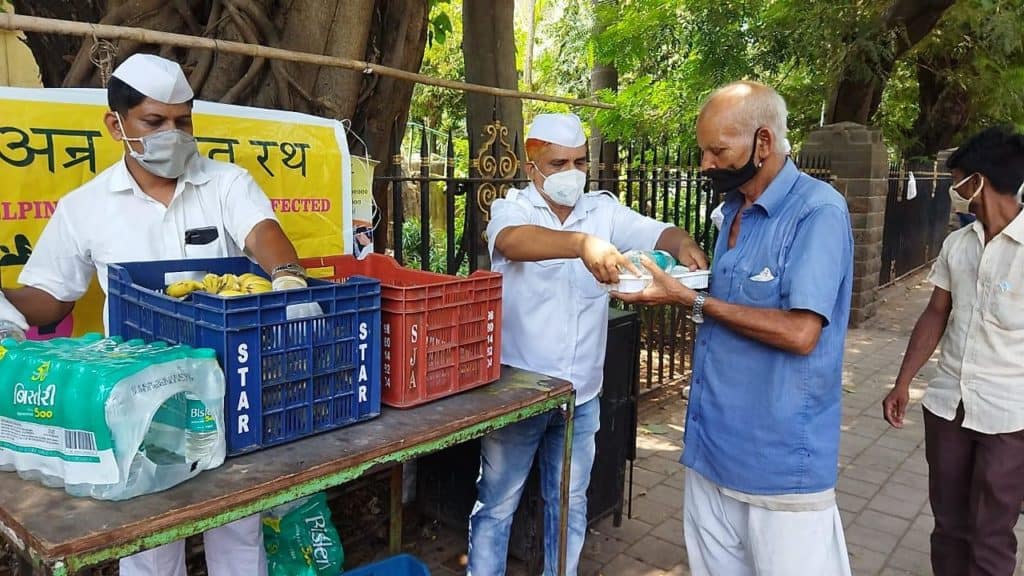Many employers have shifted to a ‘work from home’ model since last year’s lockdown. This has affected the livelihoods of Mumbai’s famous dabbawalas who deliver packed food to office-goers around town.
But that has not stopped them from helping the needy. Some of the dabbawalas provide food to the relatives of hospitalized patients in various state-run and civic-run hospitals of Mumbai.
Such generosity is exhibited despite many dabbawalas being unable to meet their monthly needs. They seek relief from various organisations to meet the basic needs of their families. “Since last year because of the lockdown, we have been struggling to stock up food for our family. We are not able to earn a stable monthly income since last year. We have seen the struggle ourselves and so we wanted to step out and provide food for the people who don’t know where to go in search of food during the lockdown,” said 38-year-old Anantha Talekar, a dabbawala residing in Andheri, who now has started working as a milkman because he doesn’t know when will the tiffin delivery service start again in Mumbai.

Distributing food in front of Mumbai hospitals
With the help of the Citizens Association for Child Rights (CACR) organisation, the dabbawalas are providing over 250 cooked meals, banana, and one water bottle, through the ‘Roti Bank’ initiative.
He further added, “The patients admitted in the state-run and civic-run hospitals usually travel to Mumbai from rural parts of India. They don’t have a home in Mumbai and many of them prefer to stay in the hospital along with the patients or on streets outside the hospitals. Many of these relatives can’t manage to have food and shelter. We are trying to help them by providing food on a daily basis.”
Every afternoon the dabbawalas stand outside KEM Hospital in Parel to distribute the food packets. There are three major hospitals – KEM Hospital, Tata Memorial Hospital, and Bai Jerbai Wadia Hospital, in the vicinity. Distributing the meal outside KEM Hospital helps them reach more needy people.
While the Roti Bank initiative has been launched over five years ago by the Mumbai Dabbawala Association, the aim of the initiative was to collect leftover food from house parties, family functions, hotels, and restaurants and distribute them to the poor or needy people on the street. “We had to stop the initiative last year because there were restrictions on house parties, gatherings, and functions. Hotels and restaurants were shut during the lockdown. So, we never got any calls from citizens or hotel managers to collect the leftover foods which can be distributed to the people staying on the streets,” said, Subhash Talekar, a spokesperson of Mumbai Dabbawala Association.
Read more: The spirit of Mumbai – surviving against all odds
Dabbawalas roti bank
Looking at the effect on people because of the lockdown, a few of the dabbawalas came together to start the Roti Bank again in May 2020. The food was donated by non-profit organizations. “The donation drive was functional for a month last year. But we could not continue it further because three of our group members were diagnosed with mild coronavirus symptoms. The number of cases was rising in the city and no were vaccines available. We did not want to risk our lives,” added Subhash Talekar, who got his first jab of the Covisheild vaccine and is waiting for the second dose.
“Looking at the second wave’s effect on the people, we thought of starting the initiative again by approaching few organisations to donate food. It has been a week now that we are back on street to distribute the donated food to the needy,” said 41-year-old Dashrat Kedari, one of the dabbawalas who was infected last year. Kedari is still searching for a job and is currently using his savings to survive this pandemic.
Just like Kedari, there are around 2500 dabbawalas who are either doing other jobs or are still searching for a job as per their skills. Waiting for the lockdown to end and get back to normalcy, they have taken up different professions such as driver, autorickshaw driver, teacher, farmer, milkman to name a few. Many of them went back to their native villages and towns.
“We try to take as much precaution as possible by maintaining social distances, using hand sanitizer, and wearing the mask,” said Kedari.